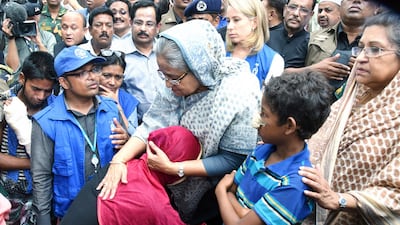The phrase “ethnic cleansing” originated in the Balkan wars of the 1990s, when Serb and Croat nationalists sought to “restore” their “purity” by “cleansing” the territories they claimed as their own of minority populations, who were expelled from their homes. Ethnic cleansing, a sacred ritual for its perpetrators, takes away from its victims their status as human beings. It is a crime against humanity in the most literal sense.
On Monday, the United Nations High Commissioner for Human Rights described what so far has euphemistically been referred to as the "Rohingya crisis" as a "textbook example of ethnic cleansing". The Myanmar military is engaged in an indiscriminate assault designed explicitly to bleach the country of its Muslim Rohingya minority population by driving them into neighbouring Bangladesh. More than 370,000 Rohingya men, women and children have fled in the last few weeks to Bangladesh, joining the 400,000 Rohingya refugees who already live there.
Bangladesh, itself a victim of a brutal war in 1971, has been a generous host. But it cannot long bear the burden alone. Bangladesh's prime minister has warned Myanmar to halt the violence against the Rohingya and create the conditions for their return. Myanmar responded by saying it would take back only those people whose citizenship could be verified. This would be amusing if it weren't so cruel because the Rohingya under Myanmar's laws are subhuman, ineligible for citizenship. Evidently, the Myanmar government's intention is to create an ethnically "pure" state by expelling as many Rohingya as possible and then denying them readmission. In Naypyidaw's cold calculation, the world will soon forget all about the Rohingya.
__________________
Read more
Myanmar operation against the Rohingya textbook ethnic cleansing, says UN rights chief
__________________
Such an eventuality, alas, is not unthinkable – which is why the international community must act now. Condemnation must make way for concrete action. Dhaka has urged India, which in 1971 intervened militarily to end the Pakistan army's atrocities in Bangladesh, to apply pressure on Myanmar. This seems unlikely given that New Delhi, governed by a Hindu supremacist party with its own deadly fantasies of "purity", is preparing to deport Rohingya refugees from India. China, competing with India for Naypyidaw's friendship, has come down on Myanmar's side.
The great powers of the future have abdicated responsibility. It falls to the West and the Middle East to take a lead on this. But what can be done? In an opinion piece in The National on Tuesday, Dr Muhammad Yunus, winner of the 2006 Nobel Peace Prize, laid out a plan. It calls for the reconstitution of the Kofi Annan-led Advisory Commission on Rakhine State, with exclusive powers to grant citizenship to the Rohingya; international monitors in vulnerable areas; and UN-supervised refugee camps inside Myanmar. Dr Yunus's personal plea to Aung San Suu Kyi, his fellow Nobel laureate and de facto leader of Myanmar, to embrace the path of peace will probably go unheeded. But the world must not emulate Ms Suu Kyi. It must act now.
Follow The National's Opinion section on Twitter

